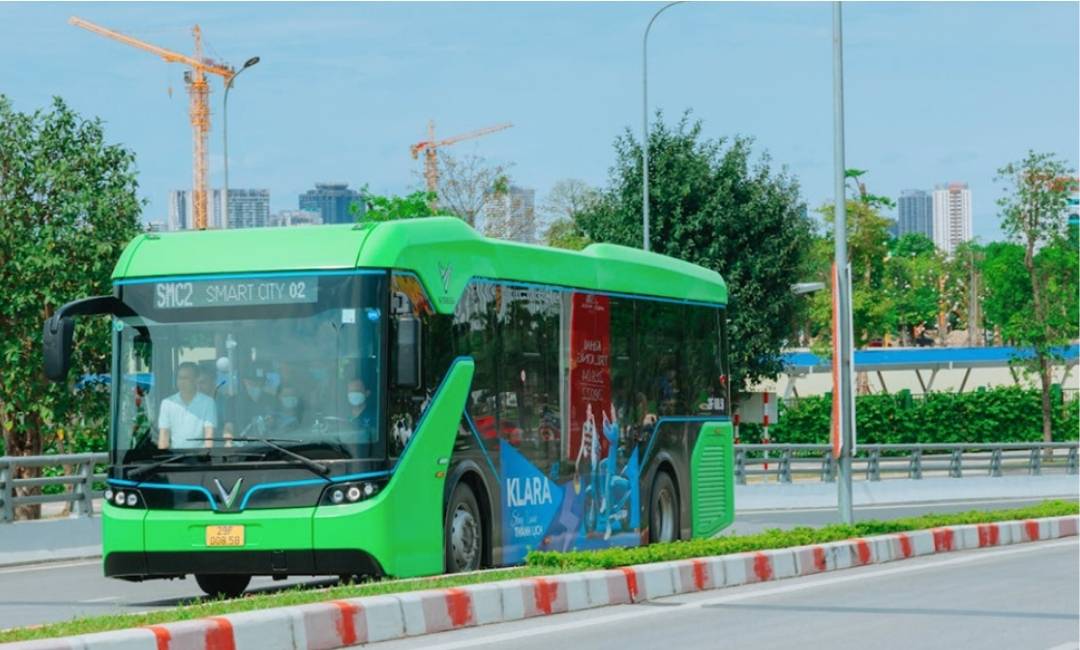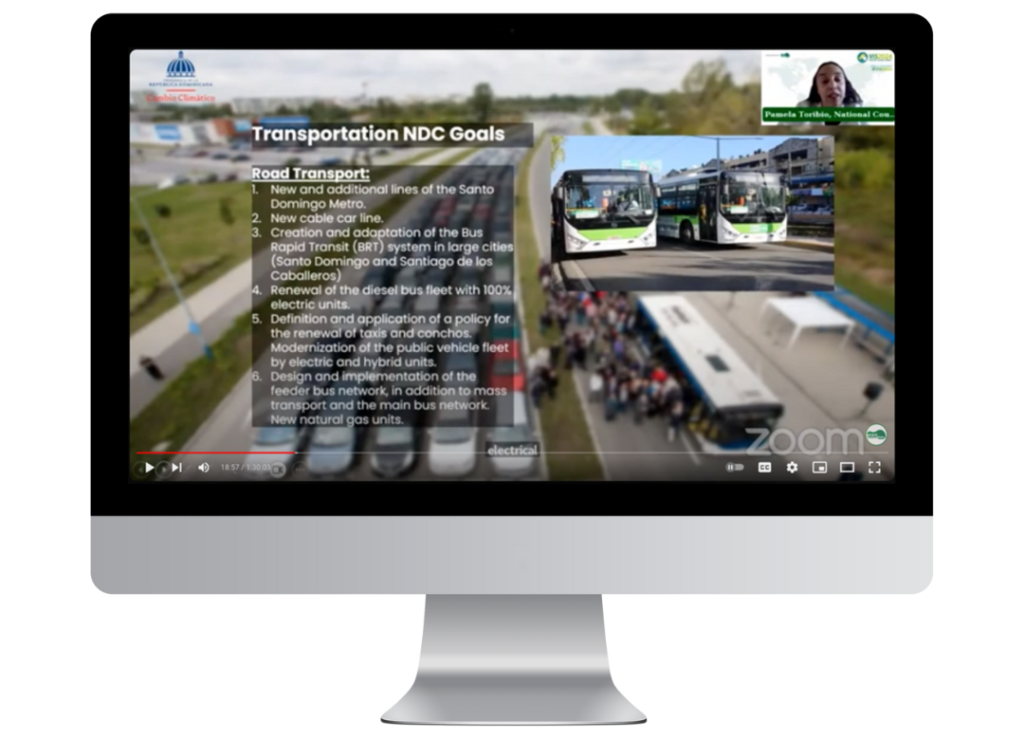In the journey towards decarbonisation, small island nations face unique challenges, but also hold distinctive advantages when it comes to deploying zero-emission trucks and buses – this was the focus of the session on zero-emission vehicles (ZEVs) at the 2024 Virtual Island Summit.
The expert panel featured Pamela Mercedes Abreu Toribio, Mitigation Analyst at the National Council for Climate Change in the Dominican Republic, Josh Simons, Assistant Director of Maintenance and Engineering Services, Bermuda Government’s Department of Public Transportation, and Sebastián Galarza, Executive Director, Sustainable Mobility Center.
Moderated by CALSTART’s Ricardo García Coyne, the session discussed the economic, logistical, and environmental aspects of transitioning to electric trucks and buses in island contexts, with a special emphasis on Latin American and Caribbean nations.
An Ideal Testing Ground
Island nations are highly dependent on imported diesel, which drives up fuel costs, reduces energy security, and contributes to pollution and greenhouse gas emissions. Despite making up a small percentage of vehicles on the road, diesel trucks and buses account for more than a third of fuel consumption and nearly 70% of nitrogen oxide emissions globally. In island environments, this problem is compounded by geographic isolation and limited access to fuel markets.
The good news is that islands are often perfectly suited for the deployment of zero-emission vehicles. Many islands are characterised by short driving distances, moderate climates, and high potential for renewable energy generation. This creates an ideal ecosystem for electric vehicles (EVs) to thrive, allowing governments and businesses to significantly reduce operating costs while cutting emissions.
Clearing a Pathway for ZEVs
The Global Memorandum of Understanding (Global MOU) on Zero Emission Medium and Heavy-Duty Vehicles, spearheaded by the Netherlands, serves as an international framework guiding island nations toward the adoption of cleaner transportation. Eight island nations, including Papua New Guinea, Tonga, Seychelles, Curaçao, Sint Maarten, Dominican Republic, Aruba and Cape Verde have already signed onto the Global MOU, committing to 30% zero-emission vehicle sales by 2030 and 100% by 2040. The Global MOU islands collaborate and share knowledge on electrification of transport through the Zero Emission Vehicle Island Taskforce (ZEVIT).
This MOU highlights a growing recognition that electric vehicles are not just a future solution, but a current necessity. The deployment of zero-emission vehicles offers numerous benefits to island economies, including reducing dependency on volatile global fuel markets, decreasing the cost of transporting goods, and improving air quality and public health by cutting down on harmful pollutants.
Moreover, zero-emission trucks and buses provide resilience in the face of natural disasters—many electric vehicles can double as mobile power sources in emergencies, using their batteries to supply power to homes and businesses during outages.
Island Case Studies
Several island nations and territories are already well on their way to electrifying their transportation sectors. The Dominican Republic, for instance, is actively transitioning its public transportation system. They aim to electrify 30% of their buses by 2030 and reach full electrification by 2050. The Dominican government has introduced legislation that incentivizes electric vehicle adoption by reducing tariffs on EV imports and creating favourable conditions for renewable energy generation.
Similarly, the British Virgin Islands (BVI) have established over 400 electric vehicle charging stations, with plans to expand that infrastructure and incentivise the adoption of EVs. The BVI has focused on collaborating with local commercial banks to provide financing options that lower the barrier to entry for electric vehicle purchases, particularly for trucks and buses.
Bermuda has also made significant strides in electrifying its public bus fleet. In partnership with the Rocky Mountain Institute, the Bermudian government selected Chinese manufacturers to supply electric buses tailored to the island’s unique needs. Their zero-emission fleet has already saved 440 tons of CO2 in its first year of operation, with projections of $20 million in savings over the next decade.
Challenges to Electrification
While the advantages of transitioning to zero-emission vehicles are clear, there are several challenges that island nations must overcome to make this vision a reality. Upfront costs remain high for electric trucks and buses, and developing the necessary charging infrastructure is capital-intensive. Panellists highlighted that training local technicians and operators to maintain electric fleets is crucial for a successful transition.
In addition, the resale market for electric vehicles is underdeveloped in island contexts. This is a concern for both private and public sector fleet managers who may face uncertainty over the long-term value of their investment in electric trucks and buses.
Another key issue is ensuring the supply of batteries and spare parts, which can be logistically difficult for isolated islands. This concern was echoed by all panellists, who noted that the capacity to repair and maintain electric vehicles—especially the batteries—is still developing, and securing supply chains is a priority. Key to solving these issues is the ability to collaborate towards these common goals.
Building Capacity and Knowledge
One of the most significant takeaways from this session was the importance of collaboration between island nations. The Zero Emission Vehicle Island Task Force, established to promote the adoption of zero-emission vehicles across island territories, serves as a platform for knowledge sharing, technical assistance, and policy support. As discussed in the session, islands are often isolated from larger markets and face similar challenges when it comes to electrifying transportation.
Collaboration among islands allows for the pooling of resources, sharing of best practices, and alignment of policies, all of which help to overcome barriers to entry. By working together island nations can scale up pilot projects, tap into international financing mechanisms, and develop the local expertise needed to maintain their zero-emission fleets.
An Increasingly Positive Outlook
The road to full electrification is still long, but the momentum is building. Countries in Latin America and the Caribbean are increasingly focusing on pilot projects to test the feasibility of electric mobility, with projects currently underway in Costa Rica, Jamaica, Grenada, St. Lucia, Antigua and Barbuda, Ecuador, Peru, and Chile.
These projects range from electric bus deployments to government fleet electrification, with support from international organizations like the United Nations Environment Programme (UNEP). To facilitate these efforts, the Latin American and Caribbean Platform offers technical assistance, policy development, and a common help desk for EV stakeholders.
By addressing financing challenges, building infrastructure, and fostering international collaboration, island nations can transition to zero-emission trucks and buses—creating cleaner, more resilient, and economically sustainable transportation systems.
The transition to zero-emission trucks and buses is both a necessity and an opportunity for island nations. With the right policies, infrastructure, and collaboration, island states can reduce their reliance on imported diesel, save money, and protect their natural environments. As more countries sign on to the Global MOU and pilot projects continue to demonstrate the viability of electric vehicles, the future of transportation in island contexts is looking greener every day.





